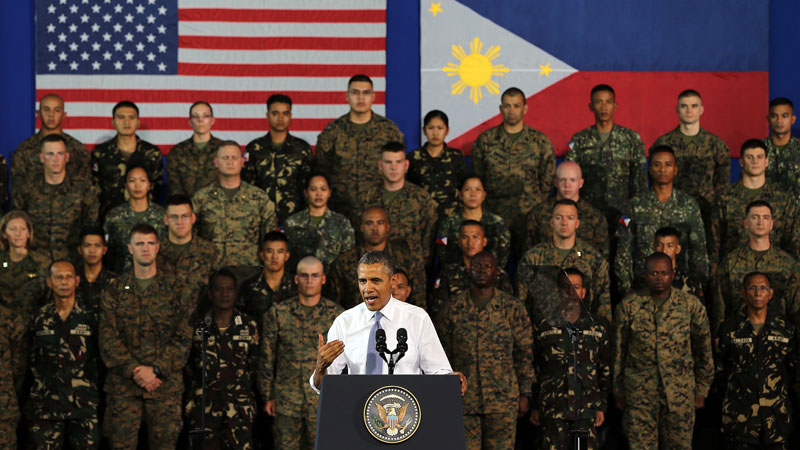
OBAMA AT THE FORT. US President Obama speaks to US and Filipino troops at the Army Gym in Fort Bonifacio in Taguig City where he reiterates the US ironclad commitment to defend Philippine security and sovereignty. Behind him are members of the Philippine and US armed forces. RAFFY LERMA
MANILA, Philippines—“Our commitment to defend the Philippines is ironclad and the United States will keep that commitment, because allies never stand alone,” US President Barack Obama said on Tuesday, repeating a statement he made at the state dinner on Monday night.
Obama addressed his brief, spontaneous remarks to 200 Filipino and American soldiers at the sweltering Army Gym in Fort Bonifacio before his departure after an overnight stop in Manila.
Quoting from the 1951 Mutual Defense Treaty (MDT), Obama on Tuesday vowed to defend the Philippines and warned potential aggressors that allies never stand alone.
Quoting from the MDT, Obama said that both nations have pledged to help defend each other “against external armed attacks, so that no potential aggressor could be under the illusion that either of them stands alone.”
He emphasized that “deepening our alliance is part of our broader vision for the Asia-Pacific,” a reference to his “pivot to Asia” policy.
Obama said that territorial integrity and sovereignty needed to be respected, reiterating support for the Philippines’ protest in the UN arbitral committee to resolve territorial disputes in the South China Sea, which Beijing claims as its giant lake.
“We believe that international law must be upheld, that freedom of navigation must be preserved and commerce must not be impeded. We believe that disputes must be resolved peacefully and not by intimidation or force,” Obama said.
Although the American president told a news conference on Monday that “our goal is not to contain China,” the state-run China Daily on Tuesday said in an editorial that Obama’s visit to South Korea, Japan, Malaysia and the Philippines made it “increasingly obvious that Washington is taking Beijing as an opponent.”
Obama said that the new 10-year Enhanced Defense Cooperation Agreement (Edca) signed on Monday would support efforts to strengthen the Armed Forces of the Philippines, pave the way for more joint military training and exercises. “American forces can begin rotating through Filipino airfields and ports,” he said.
During Monday’s joint news conference, President Aquino acknowledged the Philippines’ anemic military capability, saying it doesn’t even have a single fighter aircraft on its inventory or helicopters capable of reaching remote areas in the country in times of emergency.
No permanent US bases
The new defense arrangement emphasizes the interoperability of the two militaries as well as capacity-building measures toward the modernization of the AFP, regarded as one of the weakest militaries in the region.
The Edca is also designed to strengthen the Philippine military for external defense, maritime security, maritime domain awareness and humanitarian assistance and disaster response.
The Edca, which has come under heavy criticism, ensures that there would be no permanent US bases in the Philippines and there would be joint use of the facilities by the Philippine and US militaries. The Edca gives full Philippine control over these facilities.
The joint training exercises to be designed under Edca are aimed at enhancing AFP capabilities and ensures a US commitment for long-term AFP capability buildup.
Filipino Navy officer cited
In his remarks on Tuesday, Obama made special mention of a Filipino Navy SEAL and three American military officers who were among the first responders to the devastated Tacloban City a day after Super Typhoon Yolanda (international name: Haiyan) hit the country on Nov. 8, 2013.
Obama asked Capt. Roy Trinidad of the Naval Special Operations Group, Marine Col. Mike Wylie, Army Maj. Leo Liebreich and Air Force Maj. George Apalisok, who were seated in front, to stand up and be recognized.
The four men were among those who worked together to determine how help could be brought in by their respective militaries given the devastation in Tacloban.
Yolanda teamwork cited
Obama compared the alliance of the Filipino and US war veterans to the same teamwork that the present crop of Filipino and US soldiers showed in several joint efforts, including their response to Super Typhoon Yolanda.
“The spirit of these veterans—their strength, their solidarity—I see it in you as well when you train and exercise together to stay ready for the future, when our special forces—some of you here today—advise and assist our Filipino partners in their fight against terrorism, and when you respond to crises together, as you did after Yolanda. Along with your civilian partners, you rushed into the disaster zone, pulled people from the rubble, delivered food and medicine. You showed what friends can do when we take care of each other,” Obama said.
Leyte landing 70th year
He noted that his visit to the Philippines coincided with the 70th anniversary of the Battle of Leyte during World War II “and the beginning of the liberation of the Philippines.”
He honored the American and Filipino war veterans present at the Army Gym who fought in World War II, endured the hardships in Bataan and Corregidor, and survived the Death March and the war camps by asking his audience to give them a standing ovation.
Most of them are in their nineties and were in wheelchairs assisted by their families and caregivers.
Obama acknowledged that the US had failed to recognize the “proud service” of many of the Filipino veterans, such as being “denied compensation as they had been promised.”
“It was an injustice. So in recent years, my administration, working with Congress and others, have worked to right this wrong. We passed a law, reviewed the records, processed claims, and nearly 20,000 Filipino veterans from World War II and their families finally received the compensation they had earned. And it was the right thing to do,” Obama said.
RELATED STORIES
Obama: Allies never stand alone
Obama says Philippine pact promotes Asia security

